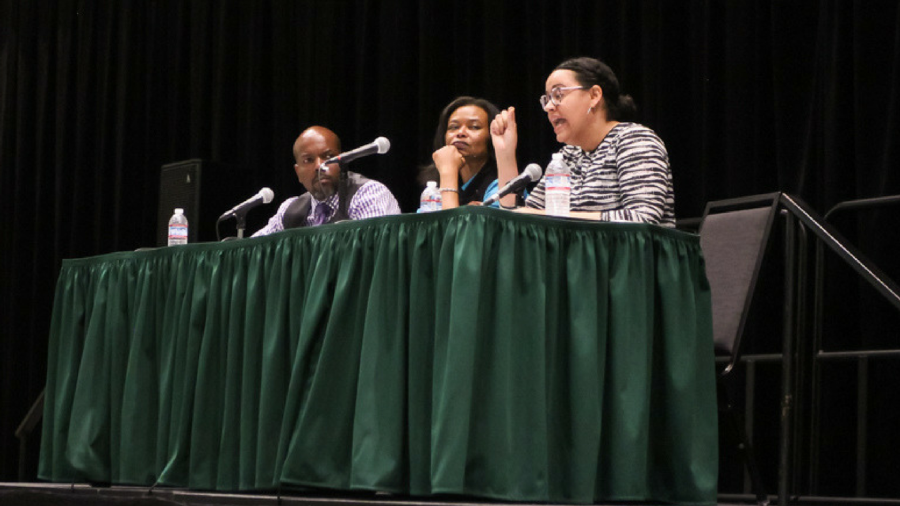Flocks of students and non-students alike gathered in the University Union Ballroom Thursday to experience the goosebumps and chills brought on by Jordan Peele’s intelligent and thought-provoking storytelling of “Get Out.”
Peele’s directorial horror debut was a hit at the box office when it premiered in February, earning itself a whopping five-star rating from Rotten Tomatoes and $21 million in the first three weeks of screening.
The film focuses on Chris, an African American man, visiting his white girlfriend Rose’s parents for the first time, and the events that unfold when Rose’s family’s motives and feelings towards Chris are unclear. To make matters worse, Chris feels constantly out of place and uncomfortable being the only black person around, not including the family’s two black servants.
Junior Isela Castro said that she liked the movie because of how different and crazy it was.
“Even though I could tell that things were (going to) get bad in the end, I had no idea how certain things were gonna play out,” Castro said. “It was really interesting and scary to watch.”
When “Get Out” was initially released in theaters, it prompted much discussion about the social commentary Jordan Peele laid out in the film regarding racism and prejudice.
While on the surface the film can be taken as a thriller with a unique spin on the antagonist, there are many messages and themes regarding black and minority identity woven into each scene.
The post-film panel discussion which featured Sac State professors John Johnson, Michele Foss-Snowden and Davin Brown, who touched on the deeper messages of race within the film and how members of the audience personally interpreted it.
Even before the panel discussion began, the connection the audience had with the protagonist Chris was obvious, with cheers emitted from the crowd during his moments of triumph, and groans of despair when Chris found himself in uncomfortable, dreadful situations.
Junior Caroline Kingsley said that as scary as the film was, it also managed to echo things that she sees in the real world.
“I liked that it really made me think about how situations can often differ for each person depending on things like race, gender and privilege,” Kingsley said.
While the film used the horror-styled setting as a primary plot device, it is a reflection of how many people are feeling and experience in the current political landscape.
“We know Jordan Peele primarily as a comedian but what’s interesting about that is that horror and comedy both function in a very similar way,” Foss-Snowden said. “When we have some sort of social commentary in film or television, that social commentary gets to act as a sidebar with the larger more obvious goal, such as to scare you.”
The UNIQUE program’s screening of “Get Out” provided an opportunity for open discussion with the expert panel to dive deeper into the many racial elements of the movie, which prompted many audience members to have an even better understanding of Peele’s vision and other underlying messages about race and racism.






























































































































